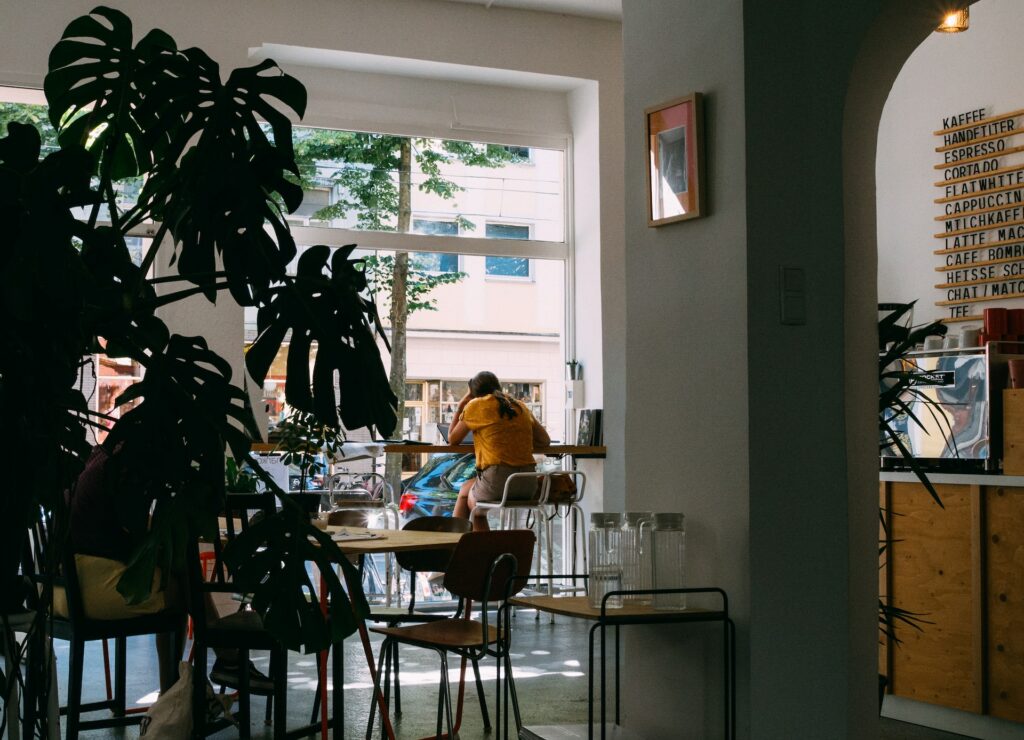As the digital nomad lifestyle continues to grow in popularity, we ask “Can it be sustainable?” Here are some ways to make your impact a positive one.

A digital nomad is someone who works online from anywhere in the world. Some might relocate to a new ‘hood and stay there for six months or more, whilst others will keep moving every few weeks. Some might live nomadically for years; for others, it’s a short-term fix. Although it was already an increasingly popular way to live, the COVID-19 pandemic led to a boom in digital nomadism as offices closed and remote work was normalised.
The appeal is understandable. A sense of freedom. A change of scenery whenever you like. New people to meet. The ability to move on when the weather takes a turn. And with the rise of Airbnbs and co-working hotel spaces, it’s increasingly easy to find a long-term spot to work, eat and sleep that doesn’t break the bank.
But as more of us find the value in this lifestyle, how can we put the brakes on any potentially damaging consequences? Let’s take a look.

Fly less
Digital nomads are often guilty of taking lots of flights as they travel around the world. But this is a relatively easy thing to fix:
- Stay longer in one place, rather than moving between multiple destinations.
- Travel by public transport whenever you can – read our ideas on flight-free travel here.
- Opt for closer destinations to reduce long-haul flights.
- Aim to book direct flights or the most direct route to reduce emissions.

Pick your location
Of course you’ll need to stay somewhere that allows you to work – with decent WiFi, for example – but you can pick locations that allow you to have a positive impact, too. Your money may be far more appreciated in places – countries, cities or even specific neighbourhoods – that aren’t already overrun with tourists and other digital nomads. You might also be swayed by the ease of travelling to a destination (can you get there by train?) or the availability of responsible hotels. On that note…
Book responsibly
There are several things to bear in mind when booking accommodation. As well as location, WiFi connectivity, comfort factor and so on, there are things to consider as to the environmental and social impacts of your temporary pad.
- Energy – Prioritise places using solar or other clean energy sources, good insulation if you’re in a cold-weather country and power-saving systems and fixtures.
- Water – If you’re heading to a drought-prone area, look for places with low-flow showerheads, grey water systems and responsible water-saving policies.
- Social impact – Airbnbs are so easy, but they can be problematic if contributing to gentrification and a shortage of housing for locals. Do a little bit of research. Sometimes Airbnbs are just locally owned guesthouses. Other times they’re large apartment blocks bought by a developer to use solely for Airbnb rentals, which can result in local housing shortages and inflated prices. Airbnb alternatives such as Fairbnb.coop aim to offer the same convenience without the ethical issues.
- Ownership and employment – We should look to benefit locals as much as possible and to support businesses that employ fairly and diversely.
- Food – If you’re staying somewhere that serves food (such as a hotel with a restaurant), avoid places with big buffets where a mountain of waste is inevitable.
- Plastics – You don’t need single-use plastic bottles where tap or filtered water is available. Support places that have committed to reducing their plastic waste.
Obviously you as a guest have a responsibility to lessen your impact at ‘home’ too – turn off the lights and A/C when you head out, don’t leave the water running unnecessarily, don’t ask for towels or linens to be washed every other day, and – it should go without saying, but… – be kind and respectful to staff!

Spend locally
One of the biggest benefits digital nomads have for a place is the money they spend. So make it count! Look for small independent stores over chains or popular tourist hangouts. If you’re booking tours, seek out local guides and, if you have a good time, leave them a great review online so others can have the same experience.
Be a good guest
Be respectful of local customs and cultures, always. Take your trash home from the beach or put it in a bin. Avoid exploitative experiences (a lot of activities involving wildlife, for example, or ‘poverty tourism’ tours). Don’t throw raging house parties in quiet neighbourhoods. The obvious stuff.
If you’re making a place your temporary home – be it a city or an island – you can maximise your positive impact by being helping out with community efforts during your stay. Why not get involved with a beach cleanup, for example? If you’re not keen on being hands-on, you could donate to a local charity.
And if you’re shedding some luggage weight, make sure you donate any good-condition items to a nearby shelter or charity shop.

